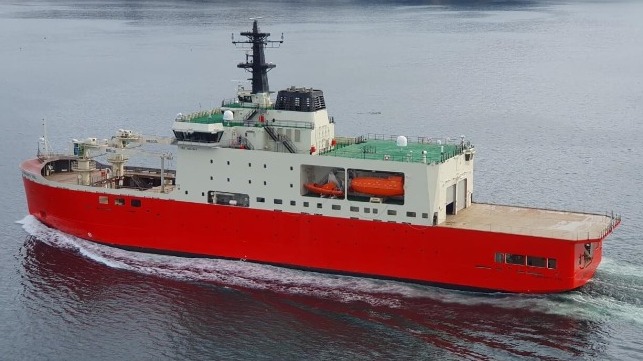Jan. 4, 2025

United States President Joe Biden (NOT SHOWN) holds a bilateral meeting with President Gabriel Boric of Chile in the Oval Office of the White House in Washington, DC on Thursday, November 2, 2023. Photo by Chris Kleponis/ UPI | License Photo
Jan. 4 (UPI) -- Chilean President Gabriel Boric has become the first leader in the Americas to visit the South Pole, his government confirmed.
Boric arrived at the Amundsen-Scott South Pole Station Friday, where the temperature sat at more than 20 degrees below zero.
Chile's Minister of Environment Maisa Rojas posted a video on X of herself along with Boric recorded at the South Pole.
Boric's entourage on the two-day voyage dubbed Operation Pole Star III included scientists, military personnel and members of his own government cabinet.
"This is a milestone for us. It's the first time a Chilean president has come to the South Pole and talked about Chile's Antarctic mission," Boric said on a Chilean TV broadcast after arriving,
Named after Norwegian explorer Roald Amundsen, the Amundsen-Scott South Pole Station is the southernmost year-round research station in the world and operated by the U.S. National Science Foundation.

Boric said Chile is looking to expand its scientific and environmental footprints in the region, where the country's activities have historically been limited to the northern sector of the Antarctic Peninsula.
"Operation Pole Star III will extend environmental monitoring of concentrations of natural and anthropogenic pollutants on the Antarctic continent, with an emphasis on black carbon. It will also provide first-hand knowledge of the management of environmental standards implemented at the Amundsen-Scott Station, with a view to obtaining knowledge for the operation of current and future Antarctic bases in Chile, the Chilean government said in a release on its website.
"This visit is important as the government is working intensively on promoting science, environmental protection and economic growth. It also takes place at an important time for the scientific activities that Chile is carrying out in the area, which we are now expanding with the incorporation of the Almirante Óscar Viel icebreaker."
Chile's President Visits South Pole t Mark Start of Research V

As great-power competition intensifies in Antarctica, Chilean President Gabriel Boric opened the new year by visiting the region. The historic trip saw Boric reach the South Pole, becoming the first Latin American leader (and third leader globally) to visit the world’s southernmost point. The other two visits by heads of state include the 2007 trip by then-New Zealand Prime Minister Helen Clark and former Prime Minister of Norway Jens Stoltenberg in 2011.
Boric was accompanied by other senior government and military officials to mark the start of Chile’s new Antarctic mission, Operation Polar Star III. The expedition is a move by Chile to expand its research from the northern areas of the Antarctica Peninsula, where historically it has been involved, to include other parts, such as the Bellingshausen Sea and the Weddell Sea.
“Operation Polar Star III is a diplomatic, scientific, environmental and aeronautical milestone for Chile, which consolidates our position in the eyes of the entire world as a gateway to Antarctica. Our country’s role in the White Continent is crucial for international scientific research and to help in tackling challenges such as climate change,” said Gabriel Boric.
Notably, the expedition was also supported by other international partners such as the British Antarctic Survey and the United States’ National Science Foundation. The highlight of this international cooperation is President Boric on Friday touring the U.S Antarctic research station in the South Pole, the Amundsen Scott Station.
During the next 90 days, the Chilean research vessel Karpuj will be supporting the scientific team of the National Antarctic Science Program on trips across the Antarctic Peninsula. Chile has also recently bolstered its Antarctic research capacity by commissioning a new icebreaker Almirante Viel. The delivery of the vessel marked a major milestone for Chile as it was built in a domestic shipyard. It is the largest scientific ship to be built in South America.
With countries such as China and Russia seeking expanded influence in Antarctica, the region’s governance system is steadily shifting from a state of cooperation to competition. Historically, Antarctic states have pledged to conserve this pristine region, but this is quickly changing. Russia has reportedly been exploring Antarctica for oil and gas, an activity that is against the 1959 Antarctic Treaty.
No comments:
Post a Comment